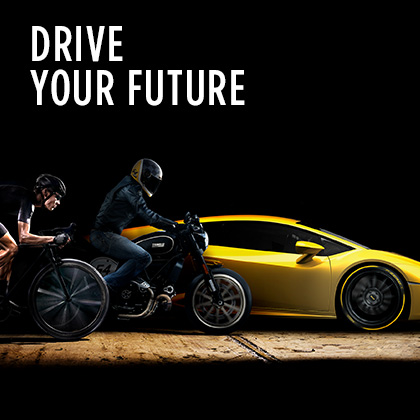Pirelli ready to stay cool in Jordan
Just like Pirelli's road car tyres, which have to cope with all the conditions that the world's roads throw at them, the Scorpion rally tyre found on every car competing in the World Rally Championship is able to deal with an enormous variety of surfaces and weather. The story so far has seen Pirelli tyres perform at their best in the ice and snow of Sweden, followed by the rough gravel and high altitude of Mexico. Now the crews head to the desert-like conditions of Jordan, round three of the World Rally Championship, which has only run once before as part of the world series back in 2008. Despite comparatively little previous experience of the stages, the adaptability of Pirelli's tyres is enough to soak up the demands placed on them by the sand, rocks and heat of the desert. The hard-compound Scorpion tyres not only have to provide traction but also disperse the surface sand as efficiently as possible through the tread pattern to find good grip. However, there's a small chance that the Scorpion tyres will have to cope with water as well as sand because of recent unusually wet conditions in Jordan: the heaviest rain that has fallen there in 20 years. The capabilities of the Pirelli control tyre though, which is supplying the World Rally Championship in a three-year deal from 2008 to 2010, enables it to work well even in the widest variety of conditions. Nowhere is this contrast greater than in the different altitudes of the Jordan Rally, which takes place at around 400 metres below sea level, the lowest point in the world, and the previous round in Mexico, which took the crews up to 2800 metres through a mountain range. Ford driver Mikko Hirvonen, the winner of the Jordan Rally with Pirelli when it was last run as a round of the World Rally Championship in 2008, commented: "I have to say that the tyres have been really good under all sorts of different conditions. They've let us get on with the job, which is to try and win the World Championship this year. We've had a good test before this event, and I'm confident that we'll be fully competitive in Jordan." The rally maintains broadly the same format as it did in 2008, with a compact route based around a service area in the Dead Sea resort, about an hour south of the historic capital city of Amman: one of the oldest inhabited cities in the world, with the first civilisation recorded there in around 8500 BC. Pirelli's Rally Manager Mario Isola commented: "Jordan is certainly one of the most challenging events we will face all year, simply because of the huge variety of conditions that we are likely to experience. The surface is sandy with a hard base, so on the repeated stages we would expect a reasonable amount of wear due to the abrasive surface. In some places, the roads are like asphalt. The recent changing weather will provide another variable, but we are more than confident in the abilities of our tyres to cope with these extreme conditions." Jordan is also the third round of the FIA Production Car World Rally Championship, for two-litre turbocharged Group N cars, and Super 2000 World Rally Championship, which uses normally aspirated two-litre cars. As part of its three-year deal as official tyre supplier to the World Rally Championship, Pirelli also supplies the support championships: underlining the performance and efficiency of the Italian rubber on a wide range of machinery. Joining the World Rally Championship regulars in Jordan are the competitors in the FIA Middle East Rally Championship. The last round of the Middle East series, the Kuwait Rally, was won by Khalid Al Qassimi, driving a Ford Fiesta S2000 on Pirelli Scorpion tyres. Unusually, the Jordan Rally will get underway in the morning of Thursday 1 April and finish in the afternoon of Saturday 3 April, after 21 stages and 346 competitive kilometres.















